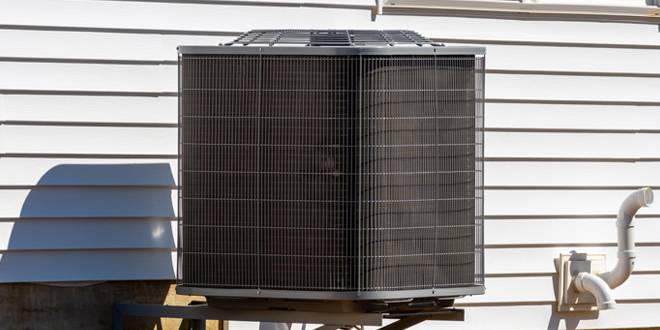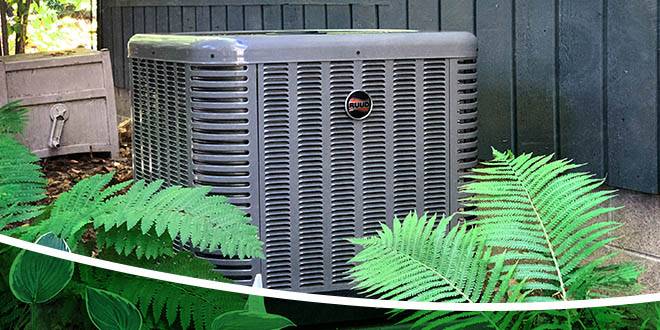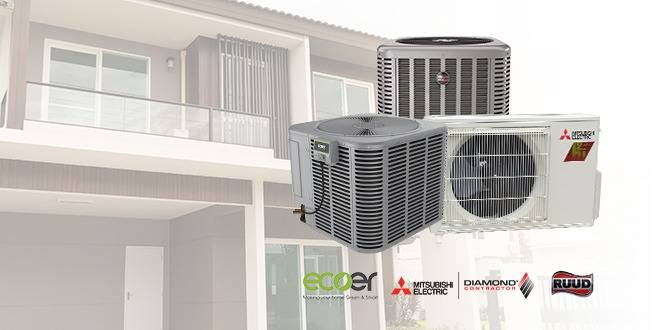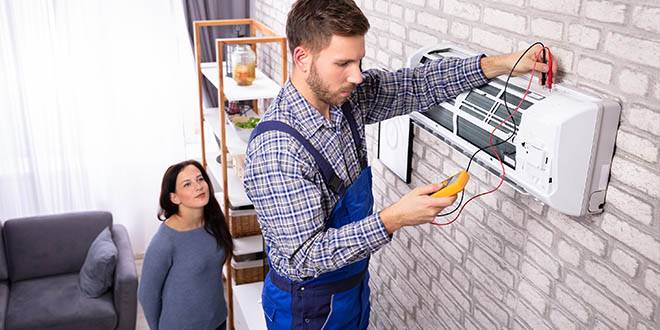
When it comes to maintaining a comfortable and sustainable home environment, heat pumps are increasingly becoming the go-to solution. At Excellent Air Heating & Cooling, we understand the significance of choosing the right heat pump for your needs.
Not only do heat pumps offer a greener alternative by leveraging the outside air, ground, or water sources to heat and cool your home, but they also provide significant energy efficiency benefits. This post will guide you through the basics of heat pumps, highlighting their importance and the advantages they bring to your home and the environment.
Types of Heat Pumps

When selecting a heat pump for your home, understanding the different types available is crucial to making an informed decision that meets your heating and cooling needs efficiently. Each type of heat pump offers distinct advantages and is suited to specific environments and requirements. Here, we delve into the details of air-source, ground-source, and water-source electric heat pumps, helping you navigate your options.
Air-Source Heat Pump (ASHPx)
Air-source heat pumps are the most common type of heat pump system in residential settings. They work by transferring heat between your home and the outside air, providing efficient heating and cooling.
Advantages:
- Cost-Effectiveness: Generally, ASHPs are less expensive to install than ground-source or water-source systems.
- Energy Efficiency: They can be significantly more energy-efficient than traditional heating and cooling systems, particularly in moderate climates.
- Versatility: Capable of heating and cooling, making them a comprehensive climate control solution.
Considerations:
- Performance in Extreme Temperatures: Efficiency can decrease in very cold climates, although newer models are improving in this regard.
- Installation Space: Requires less space than ground-source systems, making them suitable for a variety of property sizes.
Ground-Source Heat Pumps (GSHPs) or Geothermal Heat Pumps
Ground-source heat pumps, also known as geothermal heat pumps, utilize the stable temperature of the ground to heat and cool your home.
Advantages:
- High Efficiency: GSHPs are incredibly efficient since ground temperatures are more constant than air temperatures.
- Lower Operating Costs: Though more expensive to install, they often result in lower utility bills over time.
- Durability: Geothermal systems have a long lifespan, with indoor units lasting about 25 years and ground loops over 50 years.
Considerations:
- Higher Initial Cost: The installation involves significant groundwork, leading to higher upfront costs.
- Land Requirements: Suitable for homes with enough land to install the necessary ground loop system.
Water-Source Heat Pumps
These systems extract or dissipate heat by using a body of water, such as a lake, river, or pond, as the heat exchange medium.
Advantages:
- Efficient Performance: Like GSHPs, water-source heat pumps offer high efficiency due to the relatively stable temperature of water sources.
- Environmentally Friendly: Utilizes clean, renewable heat energy sources, reducing carbon footprint.
Considerations:
- Access to Water Bodies: Only feasible for properties near sufficient water sources.
- Regulatory Requirements: Installation may be subject to stringent environmental regulations and permits.
Choosing the Right Type for Your Home

The decision on which type of heat pump to install should be based on your home’s location, climate, space availability, and budget. Here are some guidelines to help you decide:
- For Moderate Climates: Air-source heat pumps are usually sufficient and cost-effective.
- For Stable, Year-Round Temperatures: Consider a ground-source heat pump for its unparalleled efficiency and lower operating costs over time.
- If Near Water: A water-source heat pump could be an excellent option, provided you have the right conditions and permissions.
Key Features to Consider
When purchasing a heat pump, it’s essential to evaluate various features to ensure you select the most suitable model for your home. From energy efficiency ratings to advanced technologies, understanding these key features will help you make an informed decision that maximizes comfort and savings.
Energy Efficiency Ratings
Energy efficiency ratings play a crucial role in determining the performance and operating costs of a heat pump. Here are the key ratings to consider:
- Seasonal Energy Efficiency Ratio (SEER): Measures the cooling efficiency of air-source heat pumps. Higher SEER ratings indicate greater efficiency and lower operating costs during the cooling season.
- Heating Seasonal Performance Factor (HSPF): Indicates the heating efficiency of air-source heat pumps. Similar to SEER, higher HSPF ratings signify better heating performance and lower operating costs during the heating season.
- Coefficient of Performance (COP): Measures the efficiency of geothermal heat pumps. COP represents the ratio of heat output to electricity input, with higher values indicating greater efficiency.
Sizing
Proper sizing is crucial for the performance and efficiency of your heat pump system. An oversized or undersized unit can lead to inefficient operation, increased energy consumption, and discomfort. Factors to consider when sizing a heat pump include:
- Square Footage: The size of your home determines the heating and cooling capacity required.
- Insulation and Air Sealing: A well-insulated and sealed home may require a smaller size heat pump than poorly insulated ones.
- Climate Considerations: Climate conditions, including temperature extremes and humidity levels, impact the heating and cooling load of your home.
Advanced Features
Modern mini-split heat pumps come equipped with advanced features that enhance comfort, efficiency, and convenience. Some key features to look for include:
- Programmable Thermostats: Allow you to schedule temperature settings based on your daily routine, optimizing energy usage.
- Variable Speed Motors: Adjusts the compressor and fan speed to match the heating and cooling demands, resulting in quieter operation and increased energy efficiency.
- Defrost Cycles: Prevents ice buildup on the outdoor unit during cold weather, ensuring efficient operation in winter conditions.
Choosing the Right Features for Your Needs
When evaluating heat pump features, consider your specific requirements, budget, and long-term goals. Here’s how to choose the right features for your needs:
- Prioritize Energy Efficiency: Opt for models with high SEER, HSPF, or COP ratings to minimize energy consumption and operating costs.
- Consider Your Climate: Select features that are suited to your local climate, such as defrost cycles for colder regions or humidity control for humid climates.
- Evaluate Budget and Payback Period: Balance upfront costs with long-term savings potential when selecting advanced features.
Installation Considerations
Professional installation is crucial to ensure the optimal performance, efficiency, and longevity of your heat pump system. Whether you’re installing a new unit or replacing an existing one, careful planning and execution are essential to maximize comfort and savings. Here are key considerations to keep in mind during the installation process:
Choosing the Right HVAC Contractor
Selecting a reputable and experienced contractor is the first step toward a successful heat pump installation. Here’s what to look for when choosing a contractor:
- Experience and Expertise: Choose a contractor with a proven track record of installing heat pump systems and expertise in your chosen type of heat pump (e.g., air-source, ground-source).
- Licensing and Certification: Ensure the contractor is licensed and certified to perform HVAC installations in your area, adhering to local building codes and regulations.
- References and Reviews: Seek recommendations from friends, family, or online reviews to gauge the contractor’s reputation and customer satisfaction.
Home Preparation
Preparing your home for heat pump installation is essential to ensure a smooth and efficient process. Consider the following factors:
- Ductwork Inspection: Assess the condition of your existing ductwork, repairing any leaks or damage before installation to optimize cool and warm air flow and efficiency.
- Space Requirements: Determine the ideal location for the indoor and outdoor units, considering factors such as accessibility, clearance, and noise considerations.
- Electrical Requirements: Ensure your home’s electrical system meets the requirements of the new heat pump unit, making any necessary upgrades or adjustments as needed.
Addressing Installation Challenges
Anticipating and addressing potential installation challenges can help minimize delays and ensure a successful installation process. Common challenges include:
- Space Limitations: Limited space for outdoor unit placement or indoor unit installation may require creative solutions or modifications to accommodate the heat pump system.
- Ductwork Modifications: In homes with existing ductwork, modifications may be necessary to accommodate the new heat pump system, such as resizing or rerouting ducts.
- Zoning and Permitting: Obtain any required permits and ensure compliance with local zoning regulations before beginning installation to avoid legal issues and fines.
The Importance of Professional Installation
At Excellent Air Heating & Cooling, we prioritize professional installation to ensure the optimal performance and efficiency of your heat pump system. Our team of skilled technicians has the expertise and experience to handle all aspects of the installation process, from initial assessment to final testing and commissioning. With our attention to detail and commitment to quality craftsmanship, you can trust us to deliver a seamless and hassle-free installation experience that exceeds your expectations.
Costs and Incentives
Investing in a heat pump involves considering various costs and potential incentives to ensure that you make a financially sound decision. Understanding the upfront costs, available incentives, and long-term savings can help you evaluate the overall value of installing a heat pump system. Here’s what you need to know about the costs and incentives associated with heat pump installation:
Upfront Costs
The initial investment in a heat pump system includes the purchase price of the unit and the cost of professional installation. Factors that influence upfront costs include:
- Type of Heat Pump: Ground-source heat pumps typically have higher upfront costs due to the extensive excavation and installation required for the ground loop system.
- Size of the System: Larger homes or buildings may require larger and more powerful heat pump systems, resulting in higher upfront costs.
- Additional Equipment: Depending on your home’s specific requirements, additional equipment such as ductwork modifications or electrical upgrades may be necessary, adding to the overall cost.
Incentives and Rebates
To offset the upfront costs of heat pump installation, various incentives and rebates may be available at the federal, state, and local levels. Common incentives include:
- Federal Tax Credits: The federal government offers tax credits for energy-efficient home improvements, including heat pump installations. These credits can significantly reduce your tax liability.
- State and Local Rebates: Many states and local utility companies offer rebates or incentives for installing energy-efficient heat pump systems. These incentives can vary widely depending on your location.
- Manufacturer Rebates: Some heat pump manufacturers offer rebates or special promotions to incentivize purchases of their products. Be sure to check with your chosen manufacturer for any available incentives.
Long-Term Savings
While the upfront costs of installing a heat pump may be higher than traditional heating and cooling systems, the long-term savings can outweigh the initial investment. Factors contributing to long-term savings include:
- Energy Efficiency: Heat pumps are highly energy-efficient, resulting in lower monthly utility bills compared to conventional heating and cooling systems.
- Reduced Maintenance Costs: Heat pumps typically require less maintenance than traditional air conditioners, leading to lower long-term maintenance costs.
- Increased Home Value: Energy-efficient upgrades like heat pump installations can increase the value of your home, providing a return on investment if you decide to sell in the future.
Making a Financially Sound Decision
When evaluating the costs and incentives associated with heat pump installation, consider the following:
- Total Cost of Ownership: Calculate the total cost of owning and operating a heat pump over its lifespan, factoring in upfront costs, incentives, energy savings, and maintenance expenses.
- Payback Period: Determine the payback period—the time it takes for the energy savings to offset the initial investment—to assess the financial feasibility of installing a heat pump.
- Consultation with Experts: Seek guidance from HVAC professionals like us at Excellent Air Heating & Cooling to assess your specific situation and make an informed decision based on your budget and needs.
By carefully weighing the costs and incentives associated with heat pump installation, you can make a financially sound decision that enhances comfort, efficiency, and sustainability in your home.
Maintenance and Care

Proper maintenance and care are essential to ensure the longevity, efficiency, and optimal performance of your heating and air conditioning system. By following a regular maintenance schedule and implementing preventive measures, you can maximize comfort, minimize energy consumption, and extend the lifespan of your investment. Here’s what you need to know about maintaining and caring for your heat pump:
Regular Maintenance Tasks
Routine maintenance tasks help keep your heat pump system running smoothly and efficiently. Consider implementing the following maintenance practices:
- Filter Replacement: Regularly replace or clean the air filters in your heat pump system to ensure proper airflow and indoor air quality.
- Coil Cleaning: Clean the evaporator and condenser coils annually to remove dirt, debris, and grime, which can hinder heat transfer and reduce efficiency.
- Inspect and Lubricate Moving Parts: Check and lubricate moving parts, such as fan motors and bearings, to reduce friction and prevent premature wear and tear.
- Check Refrigerant Levels: Monitor refrigerant levels and ensure they are within the manufacturer’s recommended range to maintain optimal cooling and heating performance.
Seasonal Maintenance Checklist
Performing seasonal maintenance tasks helps prepare your heat pump for the demands of changing weather conditions. Consider the following checklist:
- Spring Maintenance: Inspect and clean outdoor coils, check refrigerant levels, and test the system’s cooling performance before the onset of summer.
- Fall Maintenance: Prepare your heat pump for the heating season by inspecting and cleaning indoor coils, checking and calibrating thermostats, and ensuring proper airflow.
- Winter Preparation: Protect your heat pump from extreme cold temperatures by covering the outdoor unit, checking insulation, and verifying proper drainage to prevent freezing.
Professional Maintenance Services
While some maintenance tasks can be performed by homeowners, certain tasks require the expertise of trained professionals. Consider scheduling professional maintenance services, including:
- Annual Tune-Ups: Schedule annual tune-ups with HVAC professionals to inspect, clean, and optimize your heat pump system for maximum efficiency and performance.
- Refrigerant Leak Detection: Trained technicians can detect and repair refrigerant leaks, ensuring proper system operation and preventing potential health and safety hazards.
- Electrical Inspections: Regular electrical inspections help identify and address potential wiring issues, ensuring safe and reliable operation of your air conditioner.
Benefits of Regular Maintenance
Investing in regular maintenance and care for your heat pump system offers numerous benefits, including:
- Improved Energy Efficiency: Properly maintained heat pumps operate more efficiently, resulting in lower energy consumption and reduced utility bills.
- Extended Lifespan: Routine maintenance helps prevent premature wear and tear, extending the lifespan of your heat pump and delaying the need for costly repairs or replacements.
- Enhanced Comfort: A well-maintained heat pump delivers consistent and reliable heating and cooling, ensuring optimal comfort year-round.
Partnering with Excellent Air Heating & Cooling
At Excellent Air Heating & Cooling, we offer comprehensive maintenance services to keep your heat pump system operating at peak performance. Our team of skilled technicians has the expertise and experience to perform thorough inspections, identify potential issues, and provide timely repairs and maintenance. With our proactive approach to maintenance, you can enjoy peace of mind knowing that your heat pump is in good hands.
Ready to Upgrade Your Comfort? Join Us Today!
Experience superior heating and cooling with Excellent Air Heating & Cooling. 🌬️ Our expert team is here to help you select, install, and maintain the perfect heat pump or electric, oil, or natural gas furnace for your home. Don’t settle for anything less than excellence—contact us now and elevate your comfort to new heights! 🏠🌟






